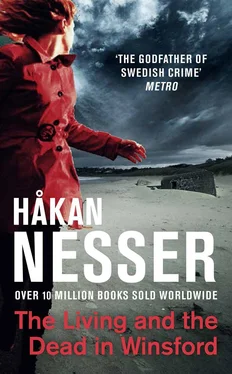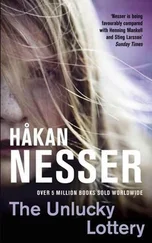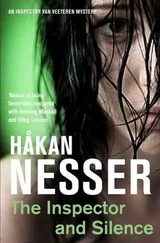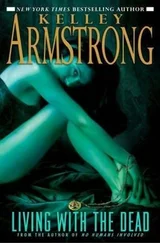Håkan Nesser - The Living and the Dead in Winsford
Здесь есть возможность читать онлайн «Håkan Nesser - The Living and the Dead in Winsford» весь текст электронной книги совершенно бесплатно (целиком полную версию без сокращений). В некоторых случаях можно слушать аудио, скачать через торрент в формате fb2 и присутствует краткое содержание. Год выпуска: 2013, Издательство: Mantle, Жанр: Криминальный детектив, на английском языке. Описание произведения, (предисловие) а так же отзывы посетителей доступны на портале библиотеки ЛибКат.
- Название:The Living and the Dead in Winsford
- Автор:
- Издательство:Mantle
- Жанр:
- Год:2013
- ISBN:нет данных
- Рейтинг книги:4 / 5. Голосов: 1
-
Избранное:Добавить в избранное
- Отзывы:
-
Ваша оценка:
- 80
- 1
- 2
- 3
- 4
- 5
The Living and the Dead in Winsford: краткое содержание, описание и аннотация
Предлагаем к чтению аннотацию, описание, краткое содержание или предисловие (зависит от того, что написал сам автор книги «The Living and the Dead in Winsford»). Если вы не нашли необходимую информацию о книге — напишите в комментариях, мы постараемся отыскать её.
The Living and the Dead in Winsford — читать онлайн бесплатно полную книгу (весь текст) целиком
Ниже представлен текст книги, разбитый по страницам. Система сохранения места последней прочитанной страницы, позволяет с удобством читать онлайн бесплатно книгу «The Living and the Dead in Winsford», без необходимости каждый раз заново искать на чём Вы остановились. Поставьте закладку, и сможете в любой момент перейти на страницу, на которой закончили чтение.
Интервал:
Закладка:
‘You can take out those bottles when you’ve finished with the rest of it,’ said Rosie. The girl curtseyed, and returned to the inner regions.
‘It’s hard to get good staff,’ said Rosie to nobody in particular.
Robert cleared his throat and looked as if he was about to say something, but nothing came of it. Rosie switched on the television, which was attached to the wall high up under the ceiling. All four of us gaped at a sports quiz for half a minute — not Castor, he was asleep — then Rosie switched off.
‘Does it taste all right?’
I had eaten only two mouthfuls so far, but assured her that it was absolutely delicious.
‘She’s good in the kitchen in any case,’ said Robert.
‘Not only there, unfortunately,’ said Rosie, and I gathered that she had other sides in addition to the rose-tinted one.
I stayed at The Royal Oak for nearly two hours, and drank a second glass of red wine. While I was sitting there three other customers arrived. A young couple only stayed long enough to drink whatever it was they had ordered, but soon after they left a man of indeterminate age came in. He was tall and lanky with dark, slightly tousled hair, and sat down at the table next to mine with a pint of ale and a portion of cod and chips.
After a while we engaged in a conversation.
8
I once had a childhood.
A mum and a dad who were a dental nurse and a dentist. An elder brother who was called Göran and still is, and a younger sister called Gun. We lived in a little town in central Sweden full of small businesses, Free Churches, and spoilt youngsters who were cosseted and pampered but couldn’t wait to escape into the real world. Our house had a garden with currant bushes, a mossy lawn, an old apple tree and a swing that nobody swung on any more after Gunsan, as we called her, was run over and died.
We also had a sandpit that became overgrown with weeds, and a cat that kept coming and going. Not just one cat — there were several, but only one at a time. They were all called Napoleon, even if they were female and had kittens that we either sold or gave away.
Gunsan was only eight when she died: both Göran and I were at secondary school — he was in his third year and I in my first. Some families cope with a catastrophe, but others don’t. Ours didn’t.
The bus driver who ran over Gunsan didn’t get over it either. He had a mental breakdown after backing over a little girl and killing her in the car park outside the swimming baths; his wife left him the next year and shortly afterwards he hanged himself in a forest in quite a different part of Sweden. His name was Bengt-Olov, and much earlier in his life, before he started a family and became a bus driver, he had been the best centre forward we had ever had in our local football team. Big and strong, but nevertheless fast and unpredictable. He even played twice for Sweden juniors. At the end of the forties, I think that was.
Göran took his school-leaving exam and flew the nest, and I followed suit two years later. Mum and Dad were left on their own with their dental practice, their lovely old house, and each other. By then Mum had stopped working as a dental nurse — she didn’t have the strength any more.
But before Gunsan died — and before she was born — that’s when I had a childhood. That’s the period I’ve been trying to forget about for many years. It is also astoundingly good at disappearing again the moment it crops up. It was somehow so straightforward, so full of hope and light that I am blinded. Indeed, I have often been blinded and made to feel rather ill by that mirage that manifests itself for a fleeting moment and then fades away.
And nowadays, much later in life, when I unexpectedly bump into my old schoolmate Klasse, or Britt-Inger — or even Anton come to that, the first boy I ever kissed and the one who once massaged my pudendum in a people’s park that no longer exists — on such occasions I suddenly get a lump in my throat, and feel an urge to turn round and run away. Whatever happened to you? I think. I can’t bear seeing you. Surely you can’t be Anton Antonsson with that lovely laugh and those warm, gentle hands: whatever happened to him? Where does this miserable-looking middle-aged creature with a pot belly and a strained expression on his face come from? And then Gunsan comes into my head, as I am lying in her bed under the sloping ceiling and reading Astrid Lindgren stories to her and I think — have always thought — that I don’t want that bloody childhood any more, that damned romantic glow; I don’t want to recall her half-closed eyes and her arms around my neck when I lift her out of the water and onto the jetty down by the lake and she half sings, half whispers the old Swedish folk song ‘Who can sail when there is no wind’ into my ear.
Or my mother’s and father’s funerals, I can do without them as well — there was barely a year between them and I am well aware that you can create cancer inside your body at any time if you try hard enough. That’s what my mum did as she sat at home in that melancholy house: she created cancer in her own body by thinking hard about it — it took seven years but she managed it in the end. And since my dad was buried — cause of death: a broken heart — I have hardly ever set foot again in that central Swedish town. On the very rare occasions when I have done so, I have always found it difficult to breathe, and thought that it’s like eating breakfast in the evening even though you don’t want to.
We set off shortly after midnight. It was Martin’s idea that we should start with a night drive, get to a favourite hotel in Kristianstad, have breakfast there and then take the ferry from Ystad. And that’s what we did, from a geographical perspective at least. But for some reason or other we began talking about Gunvald.
‘There’s something I’ve never told you,’ said Martin.
We had just filled up with petrol at that garage near Järna that never closes. Ahead of us was four hundred kilometres of the deserted E4, then diagonally down through Småland and northern Skåne along various numbered roads. It was the night between a Thursday and a Friday in October, dawn was light years away, and we could equally well have been in a space capsule on the way to a dead star. Aniara.
‘What? What have you never told me?’
‘I didn’t think he was mine. In the beginning I simply couldn’t believe it.’
I didn’t understand.
‘Gunvald,’ Martin elaborated. ‘I was convinced that somebody else must be his father.’
‘What the hell do you mean?’ I asked.
He laughed in that good-natured way he had been practising ever since he was forty.
‘Well, like in that play of Strindberg’s, The Father . . It’s the kind of thought that crops up in every man’s mind. Just think! What if the father is somebody else? How could you be certain? And you can’t very well ask, can you?’
He tried to chuckle. I had no comment to make. I thought it was best to let him go on. I started to toy with a very special thought, but it was too early to mention it yet. We had the whole night in front of us after all, maybe six months in fact: there was no hurry. No hurry with anything at all.
But as things turned out I never took up that thought.
‘Anyway, please don’t misunderstand me,’ he said after a few seconds of silence, drumming lightly with his fingers on the steering wheel. ‘It was nothing more than one of those obsessive thoughts, but it’s remarkable how they can take possession of you. And the fact is, he wasn’t anything like me at all — surely you have to agree about that? People commented on it, don’t you remember? Your brother, for instance.’
‘If there was ever a person who was like his father, that person is Gunvald,’ I said. ‘Not in his appearance, perhaps: but if you look inside him, you must realize that you. . that you are looking into a mirror.’
Читать дальшеИнтервал:
Закладка:
Похожие книги на «The Living and the Dead in Winsford»
Представляем Вашему вниманию похожие книги на «The Living and the Dead in Winsford» списком для выбора. Мы отобрали схожую по названию и смыслу литературу в надежде предоставить читателям больше вариантов отыскать новые, интересные, ещё непрочитанные произведения.
Обсуждение, отзывы о книге «The Living and the Dead in Winsford» и просто собственные мнения читателей. Оставьте ваши комментарии, напишите, что Вы думаете о произведении, его смысле или главных героях. Укажите что конкретно понравилось, а что нет, и почему Вы так считаете.












